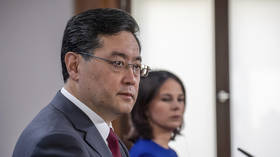
Brussels is skirting due process as it singles out Beijing

Bradley Blankenship is an American journalist, columnist and political commentator. He has a syndicated column at CGTN and is a freelance reporter for international news agencies including Xinhua News Agency.
Bradley Blankenship is an American journalist, columnist and political commentator. He has a syndicated column at CGTN and is a freelance reporter for international news agencies including Xinhua News Agency.
@BradBlank_

Germany’s Foreign Minister Annalena Baerbock, right, and her counterpart, Qin Gang, Foreign Minister of China, attend a press conference after bilateral talks at the Federal Foreign Office in Berlin, Tuesday, May 9, 2023. © Michael Kappeler/Pool photo via AP
Several weeks ago, news reports emerged that the European Union’s executive body was mulling bloc-wide sanctions on some Chinese companies for circumventing sanctions against Russia. Of course, Beijing immediately took issue with this because the Asian power is working double-time to find a diplomatic solution to the Ukraine conflict.
This is a clear case of double standards. A quick scan through the countries that are still doing business with Russia despite Western sanctions reveals that most countries on the planet are indeed doing business with Moscow. If the EU applied these sanctions evenly, it would end up destroying its own economy.
Consider that Saudi Arabia is buying record amounts of Russian diesel fuel and shipping it to the EU. Likewise, India is buying Russian oil at a significant discount and selling it to the bloc with a markup. The EU is dealing itself and its citizens a pretty raw deal in the name of supposed morals, while at the same time revealing itself to be immensely hypocritical. Brussels is singling out Beijing not because it’s circumventing sanctions but because Washington instructed the EU to do so.
On Sunday, The New Statesman published an interview with the Chinese ambassador to Brussels, Fu Cong, and former Portuguese minister Bruno Maçães. Fu said that, first of all, China would retaliate against such sanctions on its companies and indeed the next round of sanctions on Moscow that are already on the table would include some select Chinese companies. This would lead to an all-out trade war between two of the world’s largest economies – and that, according to Fu, is something Beijing wants to avoid.

Read more
What’s interesting is that Fu said that China is willing to play ball with Brussels, meaning that Beijing wants to address the public perception upfront. These Chinese companies stand accused of selling dual-purpose items, such as electronics, that are intended for civilian use but could be repurposed for the military. This is a pretty ambiguous term and could mean a lot of things. To address this, Fu and his colleagues have asked for evidence – and, funnily, the EU’s diplomatic service responded that “in our system we cannot share evidence with a foreign government.”
Think about that. The EU is accusing Chinese companies of something but won’t divulge its proof that this transgression is actually taking place. In normal court proceedings with due process the EU’s allegations would be dismissed out of hand because they are ignoring the concept of discovery.
Discovery allows both sides of a case to examine the evidence that might be presented at trial. This has a few benefits. For one, in the context of criminal proceedings, it allows the accused to see what evidence the state has against them and allow them to make more prudent decisions in terms of their plea and any subsequent agreement. After all, if you knew you were being charged with murder, but the state had only circumstantial evidence, why would you plead guilty in hopes of a more merciful sentence? You could probably win that case. In civil cases, it also allows both sides to narrow the issues being disputed and could lead to an out-of-court resolution that is in both sides’ interests.

Read more
The EU is breaking one of the most important traditions relevant to the rule of law and due process. Yet, at the same time, if a full-fledged trade war unfolds between the two sides, we are likely to see Western countries criticize the rule of law in China and its supposedly cloudy regulatory environment. Brussels does this all the time when complaining about China’s business environment even though the EU parliament essentially scrapped the China-EU Comprehensive Agreement on Investment (CAI).
For reference, just look at how US State Department officials recently categorized a legitimate decision by the Cyberspace Administration of China (CAC) to effectively ban US chipmaker Micron Technology from selling to Chinese companies working on key infrastructure projects: “… this action appears inconsistent with the PRC’s assertions that it is open for business and committed to a transparent regulatory framework.”
The EU needs to be diplomatic and show Beijing the evidence. In addition to helping legitimize Europe’s gripes about the rule of law, it would probably lead to a workable and peaceful resolution. The main reason is that Chinese authorities are seeking a diplomatic solution in Ukraine and don’t want to arm either side. Beijing asking for proof is just as much about healthy skepticism of EU sanctions as it is about being genuinely interested in finding out if the alleged activity is actually going on. The only alternative is that China will (rightly) say that EU sanctions, having bypassed the UN Security Council, are illegal, non-binding, and illegitimate.
The statements, views and opinions expressed in this column are solely those of the author and do not necessarily represent those of RT.




